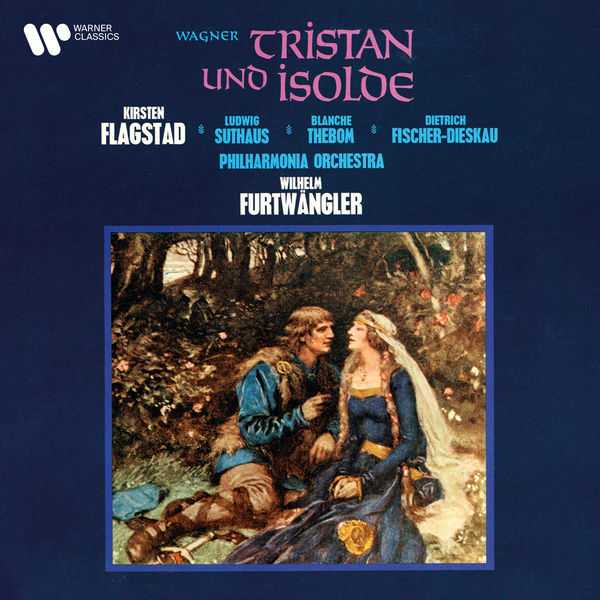

Composer: Richard Wagner
Performer: Kirsten Flagstad, Ludwig Suthaus, Blanche Thebom, Dietrich Fischer-Dieskau, Josef Greindl, Rudolf Schock, Chorus of the Royal Opera House
Orchestra: Philharmonia Orchestra
Conductor: Wilhelm Furtwängler
Format: FLAC (tracks)
Label: Warner
Catalogue: 56202176212
Release: 2021
Size: 4.94 GB
Recovery: +3%
Scan: cover
Tristan und Isolde
Act I
01. Prelude
02. Scene 1: “Westwärts schweift der Blick” (Seemann, Isolde, Brangäne)
03. Scene 2: “Frisch weht er Wind der Heimat zu” (Seemann, Isolde, Brangäne, Tristan, Kurwenal)
04. Scene 3: “Weh, ach wehe! Dies zu dulden!” (Isolde, Brangäne)
05. Scene 3: “Da Friede, Sühn’ und Freundschaft” (Isolde, Brangäne, Chorus)
06. Scene 4: “Auf! Auf! Ihr Frauen!” (Kurwenal, Isolde, Brangäne)
07. Scene 5: “Herr Tristan trete nah!” (Tristan, Isolde)
08. Scene 5: “War Morold dir so wert” (Tristan, Isolde, Chorus)
09. Scene 5: “Tristan! Isolde!” (Tristan, Isolde, Kurwenal, Brangäne, Chorus)
Act II
10. Prelude
11. Scene 1: “Hörst du sie noch?” (Isolde, Brangäne)
12. Scene 2: “Isolde! Geliebte!” (Tristan, Isolde)
13. Scene 2: “O eitler Tagesknecht” (Tristan, Isolde)
14. Scene 2: “O sink hernieder, Nacht der Liebe” (Tristan, Isolde)
15. Scene 2: “Einsam wachend in der Nacht” (Brangäne)
16. Scene 2: “Lausch, Geliebter!” (Tristan, Isolde)
17. Scene 2: “So starben wir, um ungetrennt” (Tristan, Isolde, Brangäne)
18. Scene 3: “Rette dich, Tristan!” (Tristan, Kurwenal, Melot)
19. Scene 3: “Tatest du’s wirklich?” (Marke, Tristan)
20. Scene 3: “Dies wundervolle Weib” (Marke, Tristan)
21. Scene 3: “O König, dass kann ich dir nicht sagen” (Tristan, Isolde, Melot)
Act III
22. Prelude
23. Scene 1: “Kurwenal! He! Sag, Kurwenal!” (Ein Hirt, Kurwenal, Tristan)
24. Scene 1: “Dünkt dich das? Ich weiß es anders” (Kurwenal, Tristan)
25. Scene 1: “Isolde kommt!” (Tristan)
26. Scene 1: “Noch ist kein Schiff zu sehn!” (Kurwenal, Tristan)
27. Scene 1: “Meine Herre! Tristan!” (Kurwenal, Tristan)
28. Scene 1: “O Wonne! Freunde!” (Tristan, Kurwenal)
29. Scene 2: “O diese Sonne!” (Tristan, Isolde)
30. Scene 3: “Ich bin’s, ich bin’s” (Isolde)
31. Scene 3: “Kurwenal! Hör! Ein zweites Schiff” (Kurwenal, Ein Hirt, Ein Steuermann, Melot, Brangäne, Marke)
32. Scene 3: Liebestod. “Mild und leise wie es lächelt” (Isolde)
Wilhelm Furtwängler’s 1952 EMI recording of Tristan und Isolde with the Philharmonia Orchestra is a gold standard among recordings of the opera. The integrality of his vision and his command of the opera’s large structural elements make this a version that is widely admired by listeners who love the opera. Although his reading is never rushed, and is notable for its moments of sensuous languor, for the most part, the opera has rarely sounded so impetuously and freshly imagined. The opening of the Prelude is a marvel; its primal rawness perfectly sets the stage for the searing drama. Isolde’s Act I monologue and Marke’s Act II monologue lack energy and are Furtwängler’s least effective moments, but they are more than compensated for by the blazing intensity of the “Love Duet,” the anguish of Tristan’s yearning in the third act, and the ecstatic resolution of the” Liebestod.” Kirsten Flagstad made the recording late in her career, when she was in her late 50s, and while her voice doesn’t have the youthful bloom ideal for Isolde, her vulnerability and tenderness, her subtle musicality, and the immense warmth and dignity of her exceptional voice make her an Isolde for the ages. Ludwig Suthaus never had the weight of a heldentenor of the first water, but his is an entirely respectable Tristan, fully capable of negotiating the staggering demands of the role, and his characterization is musically intelligent and nuanced. Blanche Thebom’s Brangäne is radiant, and her warning in Act II is one of the highlights of the recording. The young Dietrich Fischer-Dieskau is a vocally powerful Kurwenal, and his characterization is sharply etched. Josef Greindl sounds underpowered as King Marke, and comes across as more pathetic than really grief-stricken. The members of the Philharmonia Orchestra, who beautifully follow Furtwängler’s lead in their impassioned playing, are also stars of the performance. The variety of colors they produce, from the practically Medieval sound of the opening notes of the Prelude to the lushly Romantic passion and warmth of the second act, is remarkable. The sound is vintage, but is full, clear, and vivid. The general high level of the performance, particularly the outstanding work of Flagstad, Furtwängler, and the Philharmonia Orchestra, make this a version of the opera that should be of strong interest to any Wagnerian.